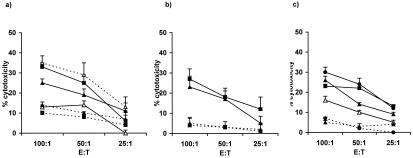Figure 4.
Induction of lymphoma-antigen-specific T cell tolerance in terminal
HOX11 transgenic mice. DCs and T cells were isolated from nontransgenic
mice ( ), healthy HOX11 transgenic mice
(
), healthy HOX11 transgenic mice
( ), and HOX11 transgenic mice with terminal
lymphoma (––▵––). Age- and sex-matched
C57BL/6 mice (
), and HOX11 transgenic mice with terminal
lymphoma (––▵––). Age- and sex-matched
C57BL/6 mice ( ) were also included. Cell lysates
were prepared from either B220+ sorted lymphoma cells or
unsorted, total spleen/lymphoma cells. T cells were stimulated twice
at 6-day intervals with autologous DCs pulsed with either lymphoma cell
lysates or OVA protein, harvested, and assayed for anti-HOX11
lymphoma-antigen-specific cytolytic activity against DC targets pulsed
with B cell lymphoma lysates (a) or DC targets pulsed
with total spleen/lymphoma lysates (c).
Anti-OVA-specific CTL activity was assessed against DC targets pulsed
with OVA protein
(---▵---)
(a). Generation of nonspecific C57BL/6
(---●---),
nontransgenic
(---■---), or HOX11
transgenic
(---▴---)
CTLs was assessed against unpulsed DC targets (a and
c). These findings were confirmed by using lymphoma cell
lysates from five additional HOX11 mice with terminal lymphoma.
(b) Immunogenicity of lymphoma cell lysates and the
in vivo generation of anti-lymphoma-specific CTLs in
elderly, healthy nontransgenic and transgenic mice. Five 14-month-old
littermates were used; one nontransgenic mouse, three premalignant
transgenic mice, and one HOX11 transgenic mice with terminal lymphoma.
The four healthy littermates were injected with DCs pulsed with
B220+ lymphoma cell lysate originating from the fifth
littermate, they were given booster injections twice and then killed,
and their spleens were used as a source of T cells. In
vivo generation of lymphoma-specific cytolytic activity was
assessed against B220+ lymphoma cell targets and
LPS-activated C57BL/6 B cells.
) were also included. Cell lysates
were prepared from either B220+ sorted lymphoma cells or
unsorted, total spleen/lymphoma cells. T cells were stimulated twice
at 6-day intervals with autologous DCs pulsed with either lymphoma cell
lysates or OVA protein, harvested, and assayed for anti-HOX11
lymphoma-antigen-specific cytolytic activity against DC targets pulsed
with B cell lymphoma lysates (a) or DC targets pulsed
with total spleen/lymphoma lysates (c).
Anti-OVA-specific CTL activity was assessed against DC targets pulsed
with OVA protein
(---▵---)
(a). Generation of nonspecific C57BL/6
(---●---),
nontransgenic
(---■---), or HOX11
transgenic
(---▴---)
CTLs was assessed against unpulsed DC targets (a and
c). These findings were confirmed by using lymphoma cell
lysates from five additional HOX11 mice with terminal lymphoma.
(b) Immunogenicity of lymphoma cell lysates and the
in vivo generation of anti-lymphoma-specific CTLs in
elderly, healthy nontransgenic and transgenic mice. Five 14-month-old
littermates were used; one nontransgenic mouse, three premalignant
transgenic mice, and one HOX11 transgenic mice with terminal lymphoma.
The four healthy littermates were injected with DCs pulsed with
B220+ lymphoma cell lysate originating from the fifth
littermate, they were given booster injections twice and then killed,
and their spleens were used as a source of T cells. In
vivo generation of lymphoma-specific cytolytic activity was
assessed against B220+ lymphoma cell targets and
LPS-activated C57BL/6 B cells.

